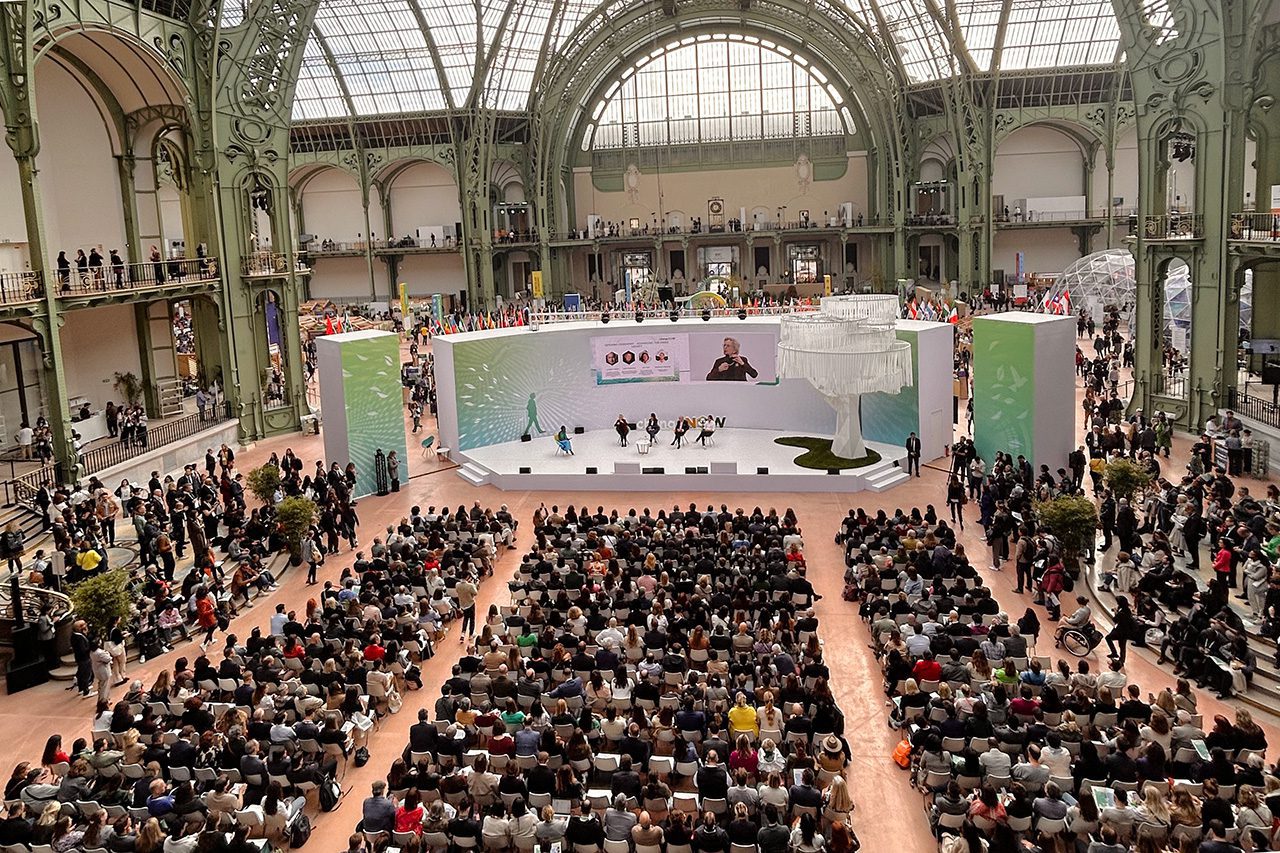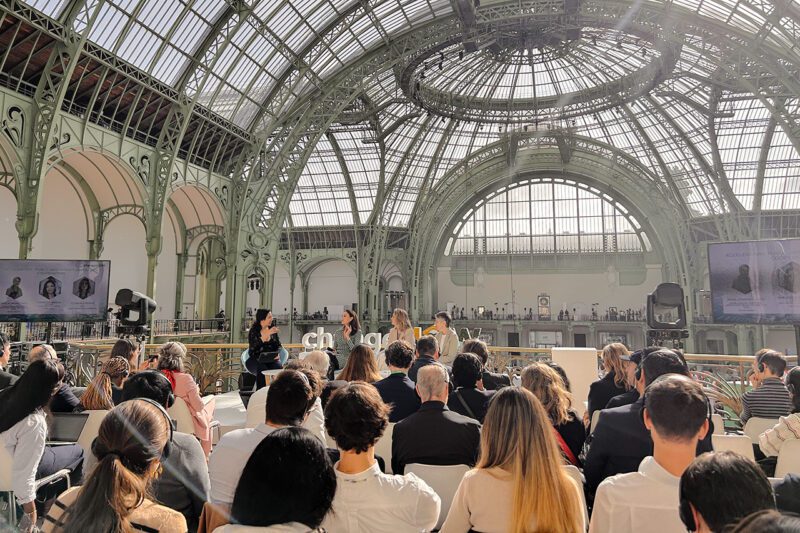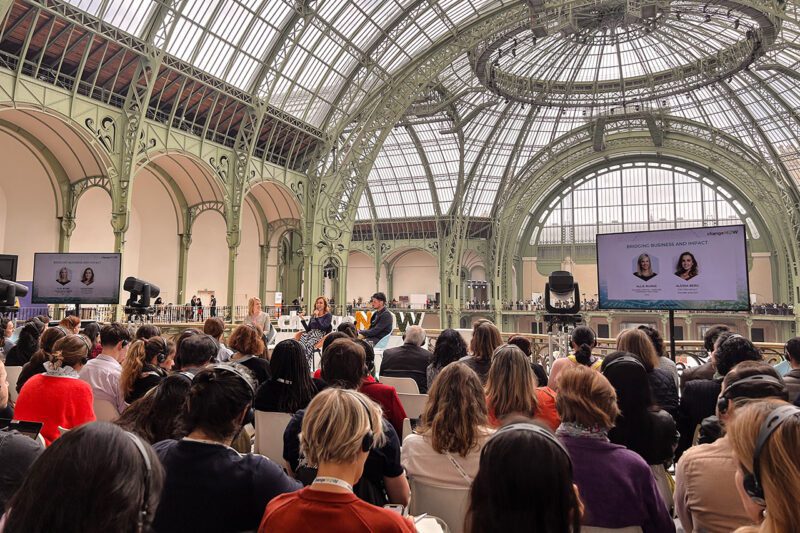Sovereign Seeds: Reclaiming MENA’s Agricultural Future
Reviving local food systems and unlocking rural prosperity
The case for a new development finance asset class

ChangeNow Summit, Paris; Photo by Gigi Aulsebrook
“We are not regenerating nature. We are nature regenerating itself.” – Alessa Berg
At ChangeNOW in Paris, amid a convergence of innovators, development financiers, and impact investors, one message stood clear: our current financial models are no longer fit for purpose. Climate collapse, violent fragility, shrinking civic space, and social upheaval have pushed us to a collective tipping point, not just environmentally, but financially, institutionally, and morally. As DFIs, public financiers, and private capital begin to reckon with this scale of disruption, a growing consensus is taking root: we must redefine what constitutes risk and return in today’s global economy.
It’s time to advocate for a new asset class: regenerative, blended, catalytic. One that can hold the nuance, urgency, and transformative potential required to respond to intersecting issues and unlock scalable solutions.
Conventional finance rests on tight models of risk-adjusted returns and fixed, securitized timelines. But in fragile and climate-impacted contexts (where volatility is high, ticket sizes are small, and institutional trust is weak) these models fall short and do not fit.
Local knowledge, rich in cultural and environmental nuance but often not quantifiable in traditional Western metrics, is routinely sidelined. This results in meaningful investment routinely withheld from the very communities most in need of transformation — and these communities fall behind.
Yet change is underway. As Françoise Lombard of Proparco highlighted, the post-Paris Agreement landscape sparked a new era for development finance, with climate finance as the initial driver. Today, DFIs are deepening this transformation, with emerging emphasis on holistic, ecosystem-aware investment approaches and shared frameworks that recognize impact as a legitimate form of return.
A key feature of this shift is the emergence of blended finance and its growing strategic value in fragile environments. Institutions like the European Investment Bank Group, World Bank, and Proparco are increasingly using tools like first-loss mechanisms, technical assistance, and co-investment platforms to de-risk projects and catalyze private investment.
The principle is simple: if DFIs put skin in the game — not just money, but trust, time, and strategic vision — and the private sector follows. As Paola Ravacchioli from the World Bank put it, the system needs DFIs to be faster, bolder, and more catalytic.
This has meant concrete action. According to Proparco, they alone invested €540 million in fragile and conflict-affected regions last year. Meanwhile, platforms like Boost Africa, supported by the African Development Bank and European DFIs, have created enabling environments for first-time fund managers in Sub-Saharan Africa, using first-loss guarantees and blended tools to make venture capital viable in high-risk settings.

Moderator Imène Maharzi (left) and speakers Paola Ravacchioli, Christine Amour Levar & Florence Roche, during the ‘Accelerating Public and Private Investors Cooperation’ Panel at ChangeNOW. Photo by Gigi Aulsebrook
Investors are already drawn to climate finance, but often through a narrow, carbon-centred lens with little room for movement. Yet as Lombard pointed out, “fighting climate change only works if we deal with things holistically.” That means investing in ecosystems, people, water access, community resilience — the full picture, not just carefully cherry-picked aspects of it.
Florence Roche of AXA emphasized that the private sector is ready to scale climate-related investment, stating that AXA has committed €5 billion annually to climate transition and €500 million to community resilience, mobilizing over €30 billion in emerging markets. But unlocking private capital at scale still hinges on tailored, risk-aligned pipelines and better alignment of incentives.
The future of finance lies in the messy, human spaces traditional models often avoid. But these are also the spaces where innovation thrives.
Here, trust and transparency emerge as critical themes. As Christine Amour-Levar of Investors for Climate noted, there’s still a bridge to be built between family offices, sovereign wealth funds, and DFIs. A lack of credible data and shared standards continues to stall collaboration.
What’s needed now, as highlighted by several speakers at ChangeNOW, is the formal recognition of a new development finance asset class, one that blends concessional and commercial capital, and centres regenerative outcomes.
This isn’t just semantics. A new asset class would come with its own risk-weighting rules, reporting frameworks, and regulatory treatment, making it easier for institutional capital to flow into fragile and climate-vulnerable contexts without penalizing return profiles. As Allie Burns, the CEO of Village Capital argued, catalytic capital is no longer reliably coming from governments and DFIs must fill that void.
There’s a growing push to frame this as “regenerative finance” — not only in the ecological sense, but as a broader ethos for economic systems that restore rather than extract. The idea is to move from reactive crisis response to proactive, trust-based investment in long-term systems change.

Moderator Giulio Berruti (right) and speakers Allie Burns & Alessa Berg during the ‘Bridging Business and Impact’ Panel at ChangeNOW; Photo by Gigi Aulsebrook
The session emphasized not just what to invest in, but how. The shift requires more than capital — it needs technical expertise, social capital, and new forms of partnership.
Innovators like Alessa Berg of Top Tier Impact and Leah C. Pedersen of Convergence emphasized the importance of translation: between investors and communities, business and impact, north and south. “We are talking about translating different perspectives,” Berg said. “If we continue like this, we will wipe out our species.”
The tools and ideas are there. Now it’s about building the architecture: regulation, language, trust, and bold leadership.
Examples like Singapore’s foodtech initiative, which shifted public and sovereign capital into startups aiming to produce 30% of food domestically by 2030, show what’s possible when catalytic capital meets political will.
From land restoration to women-led funds to early-stage African startups, the future of finance lies in the messy, human spaces traditional models often avoid. But these are also the spaces where innovation thrives. As Florence Roche put it, “We can do more, at a faster pace and bigger scale, with blended finance.” The tools and ideas are there. Now it’s about building the architecture: regulation, language, trust, and bold leadership.
It’s time to redefine risk and return, and to build a financial future that regenerates, rather than extracts. And a step in the right direction is to create a brand-new asset class.
Related Content
Comments
Deep Dives

Featuring
Clarisse Awamengwi
IE Correspondent
July 17 - 12:00 PM EST

Featuring
Russell McLeod
July 24 - 12:00 PM EST
RECENT
Editor's Picks
Webinars
News & Events
Subscribe to our newsletter to receive updates about new Magazine content and upcoming webinars, deep dives, and events.
Become a Premium Member to access the full library of webinars and deep dives, exclusive membership portal, member directory, message board, and curated live chats.
At Impact Entrepreneur, we champion fearless, independent journalism and education, spotlighting the inspiring changemakers building the Impact Economy. Diversity, equity, sustainability, and democracy face unprecedented threats from misinformation, powerful interests, and systemic inequities.
We believe a sustainable and equitable future is possible—but we can't achieve it without your help. Our independent voice depends entirely on support from changemakers like you.
Please step up today. Your donation—no matter the size—ensures we continue delivering impactful journalism and education that push boundaries and hold power accountable.
Join us in protecting what truly matters. It only takes a minute to make a real difference.
0 Comments